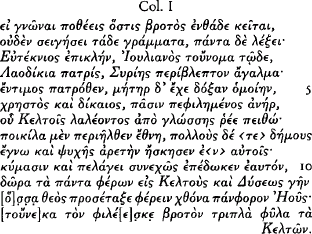Article contents
Julianus of Laodicea: rhetor or trader?
Published online by Cambridge University Press: 11 October 2013
Extract
J. Pouilloux recently published a funerary epigram from Lyon, which he dates on palaeographical grounds to the late second or early third century A.D.; the inscription refers to one Ioulianos Euteknios of Laodicea (hereafter Julianus):

- Type
- Notes
- Information
- Copyright
- Copyright © The Society for the Promotion of Hellenic Studies 1982
References
1 In Reynaud, J.-F., Audin, A., Pouilloux, J., ‘Une nouvelle inscription grecque à Lyon’, JSav (1975) 58–75Google Scholar (= SEG xxvi 1214Google Scholar). I print the text of Jones, C. P., ‘A Syrian at Lyon’, AJP c (1978) 336Google Scholar.
2 Pouilloux (n. 1) 74. This interpretation is rightly challenged by Jones (n. 1) 348–9, who argues that it is better to take τριπλὰ ϕῦλα τὰ Κελτῶν and not θεός as the subject of ϕιλέεσκε (342); this removes the most specific possibility, of a Christian god who loves Julianus. Jones easily refutes the further pro-Christian arguments of Guarducci, M., ‘Il missionario di Lione’, MEFRA lxxxviii (1976) 843–52CrossRefGoogle Scholar, ibid. 351–2.
3 So Pouilloux (n. 1) 67: ‘il est clair que s'il eût été marchand de toile ou d'aromates, on eût dit autrement le succès de cet homme’. Jones dismisses the difficulty (n. 1) 348, suggesting that professional intellectuals would have travelled by land and so would not have fitted κύμασιν καὶ πελάγει συνεχῶς ἐπέδωκεν έαυτόν (10). Philostratus occasionally happens to mention sophists travelling by sea (VS 603, 618); but the subject scarcely admits of generalisation, given that a sophist might choose to commute between far-flung major centres by sea, and reach the hinterland of each by land.
4 It might of course be argued that Proclus' example was unique; but Philostratus' account of him also contains unique information about classroom procedure: it is reasonable to assume that the biographer (as a pupil and beneficiary) was in a better position to observe Proclus' conduct than he was in most other cases.
5 An anonymous referee draws my attention to a rather different progression (Peek, GV 1049Google Scholar = Kaibel 613): the μουσικός who became ἔνπορος εὐμόρφων . . . γυναικῶν
- 6
- Cited by




